Should I worry if my helper is doing outside work?
Do you know what your helper is doing on her day off? Talking Point investigates some of the second jobs domestic workers are taking on and whether there is a case for reviewing the law against moonlighting.
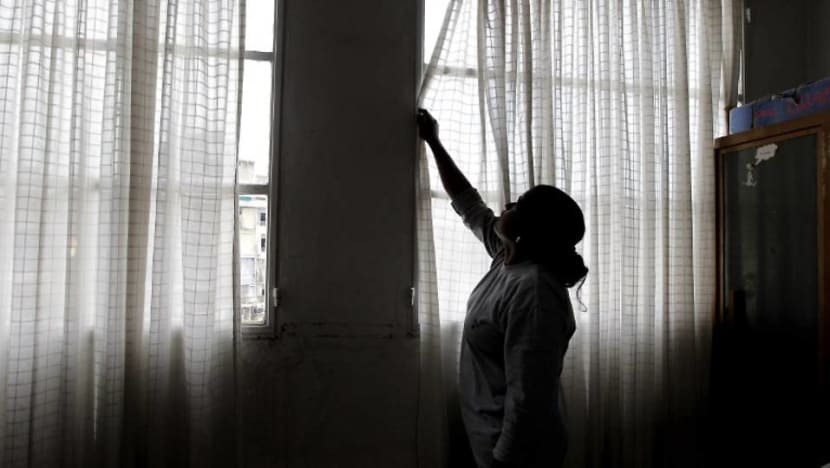
File photo of a foreign domestic worker.
SINGAPORE: Some foreign domestic workers are taking a risk and falling afoul of the law.
Over the past three years, about 30 domestic workers have been caught annually for willingly taking on second jobs, despite knowing that it is illegal for them to moonlight.
But this figure represents only the tip of the iceberg.
Pastor Billy Lee, executive director of Blessed Grace Social Services, a charity that has helped hundreds of foreign helpers with monetary issues, said about 30 per cent of maids in Singapore do part-time work — and that’s “a conservative estimate”.
Of the approximately 250,000 foreign domestic workers here, that works out at about 75,000 of them with a side hustle. It is a “deep-rooted” practice, he noted.

It can also have serious consequences, as the Manpower Ministry makes it clear that foreign domestic workers here must work only for their designated employer according to the terms of the work permit.
If convicted of breaching this, a worker can be fined up to S$20,000 or jailed for two years or both. Her work permit will be revoked, after which she will be sent home and barred from working in Singapore.
Her employer can also be fined up to S$10,000 and barred from hiring another foreign domestic worker.
So why is the part-time jobs market for these workers thriving, and should employers worry? The programme Talking Point investigates, and also asks if the law is ripe for a review.
FROM CLEANING TO SELLING GOODS
For those who hire these helpers, the cost is cheaper.
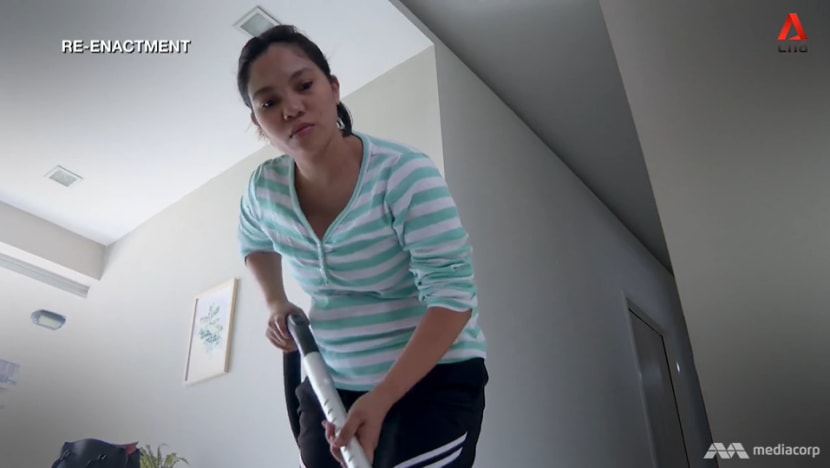
“For an agency that uses Singaporeans to do … household chores, they charge about S$20 to S$35 per hour,” said Lee. “The most (foreign domestic workers) get is S$15 an hour. Some go as low as S$10 per hour.”
Some foreign helpers who do this undocumented work on their day off can earn as much as S$100, said Jennifer Tindoy, who does not moonlight herself but knows about these jobs. “It’s a help to their families back home.”
Some helpers are asked by friends of their employers if they could clean their homes; others find their gigs on Facebook when people post job details in private groups, said Dorothy, who wanted to go by her first name only.
There are workers do it only when their employers are overseas, according to Tindoy, while Dorothy knows someone who does it on weekday afternoons “if (she) finishes the work at home” and if the part-time job is “nearby”.
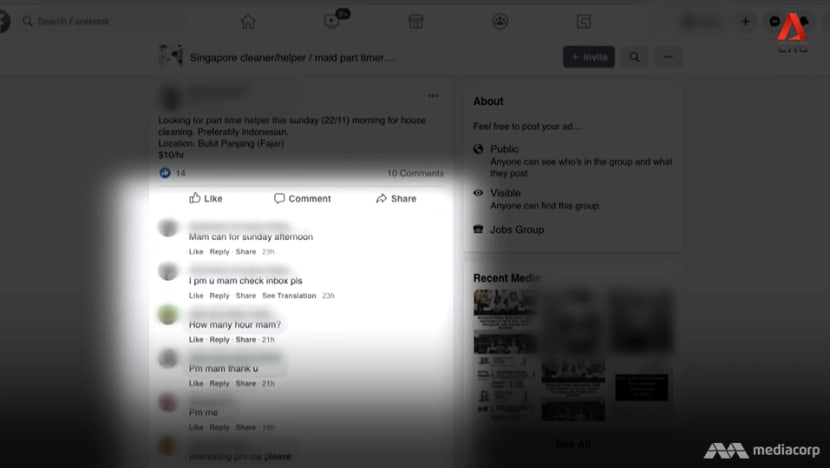
One domestic worker told Talking Point host Steven Chia, who went online pretending to be an employer looking for part-time help, that she has been doing it for around five years and that her employer even knows about it.
Cleaning houses, however, is not the only sideline. Some domestic workers go online to sell items such as handbags, clothing and beauty products from their home countries.
For example, Rose (not her real name) said she met another domestic worker at Lucky Plaza who asked her if she wanted a part-time job and introduced her to online selling last year.
“She (passed) me shoes, T-shirts, cosmetics, bras, panties, many kinds of Philippine products,” said Rose. “I (set up) a page on Facebook, then I invited my friends — about 45 people — (and) I pushed the products.”
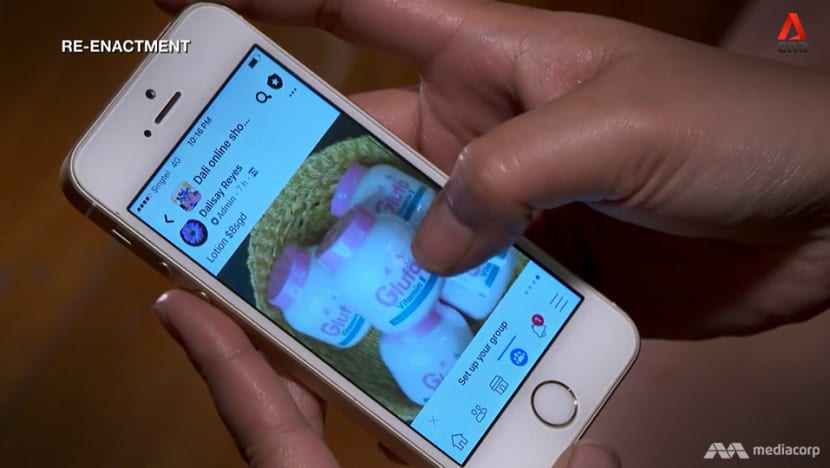
She knew her online business was illegal and kept a low profile by avoiding bulk deliveries to her buyers. But she stopped after some buyers did not pay on time.
Such online selling is still happening, however, in private groups seemingly run by domestic workers, as seen in a quick check done by Talking Point.
Rose used to make S$80 a month, and it was a “very big” amount to her.
“I agreed (to) online selling because, for me, I’m off every Sunday. I’m outside, I eat, I pay EZ-link (top-ups) — I need extra money because my salary is for my children only,” she said.
ROOM FOR FLEXIBILITY?
On average, a domestic worker’s salary in Singapore is about S$600 month. But this varies across nationalities, pointed out Jaya Anil Kumar, a case manager at the Humanitarian Organisation for Migration Economics (Home).

“Sometimes salaries are set by the respective embassies,” she said. For example, the minimum pay for Indonesian and Philippine helpers is S$550 and S$570 respectively
“The Indian and Myanmar domestic workers earn way below S$600. They earn between maybe S$450 to perhaps S$500.’’
Their pay here is lower than in Hong Kong, which is of a “comparable set-up” but where domestic workers have a minimum salary of S$800 (HK$4,630), she added.
This is why Bhing, a domestic worker in Singapore for 25 years and a volunteer with Home on her days off, cannot understand the authorities’ approach to helpers doing part-time work.
“The way they catch domestic workers … (it) is like they’re criminals,” said Bhing, who knows of someone who was repatriated.
“Why do they (the authorities) do that? Why do they never ask domestic workers, is your salary not enough — that’s why you’re doing this?”
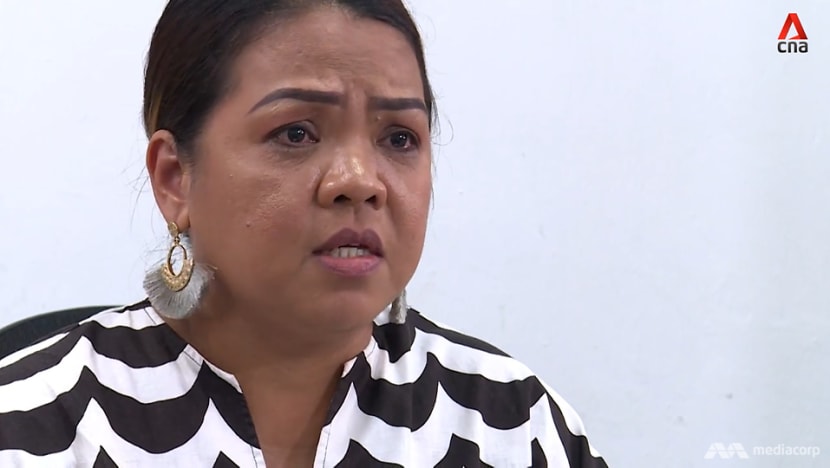
Bhing, who wanted to be identified only by her first name, said she does not encourage her friends to do part-time work. But she thinks the average S$600 salary is “not enough” with Singapore’s cost of living.
“If I send (back) S$500, and then if I’d be left (with) $100, how can I spend for myself? It’s not even a good allowance for me because we go out every Sunday to buy food … (or) toiletries,” she said.
“Many domestic workers … are the sole breadwinners of their family. Definitely, they’d have loans back home because (of) the process of applying for a job here. They need money for transportation (and) to go for training.”
Tindoy is another who thinks it is “not fair” when helpers get caught. “They’re not doing a heinous crime. It’s just a job,” she said.
Domestic worker Jade Valencia, who was part of Talking Point’s group interviews, added: “It’s hard-(earned) money, not easy money.”
Gloria James-Civetta, the head lawyer at Gloria James-Civetta and Co, has dealt with cases of domestic helpers moonlighting, and she feels that “there should be some flexibility” for them to do “small work”.
“They could offer to help the elderly, to do some cleaning services,” she said.
“They could also work from their employer’s home and do online businesses. An example would be … occasions where maids travel back to their home country and they’d come back with products from their own country, which they could sell online.”
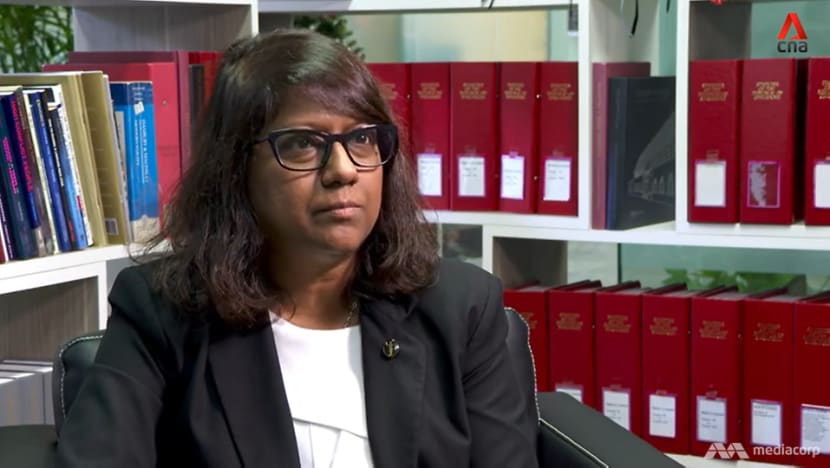
Boundaries may need to be set out, however, to avoid “vices and all that”.
“Perhaps establish the scope of work they can do, the number of hours they can do and a different insurance coverage for the maids who intend to do their own part-time work,” she suggested.
EMPLOYERS’ CONCERNS
But what do their employers think?
When it came to salaries, a survey of 1,060 Singaporeans last year found that 52 per cent thought domestic workers should be paid more than S$600 a month, while 48 per cent felt that they should be paid less.
READ: How much should maids be paid? Half of Singaporeans say less than S$600 a month, new survey shows
And on the issue of legalising part-time work for helpers, there also seems to be a split.
Sean Lim is opposed to it because he feels that they should rest and recover as argued by non-governmental organisations in lobbying for the workers to get a day off each week.

“So if we were to go against it — allowing helpers to have time to do part-time work — it would go against this principle,” he said.
Calvin Chew is afraid that allowing part-time work for helpers could lead to them to change employers. “If you were to allow (part-time work) … the consequences are that, when she comes back, she would tend to compare,” he said.
“(In) the employer’s and helper’s contract, there’s a termination clause of one month’s notice. If this thing happens, (and) my helper’s going to tell me, ‘Sir, I’m giving you one month’s notice because I found a job’ … then how?”
While some NGOs have also argued for domestic workers to have the right to change employers, he noted that this is still not allowed.

“If the helper requests an early termination, (she) doesn’t have the right to ask for a transfer,” he said. “It’s also my responsibility to make sure that when the contract is terminated, I send (her) back safely to (her) homeland.”
Sitting on the fence is Marla Rai. While she feels part-time work is “okay” per se, she wonders what would happen if the helper “gets into any kind of trouble on that day”.
“Do I have to sort of co-compensate for any losses … if she damages something in that person’s house?” she questioned.
Jolene Lim is in favour of allowing helpers to do part-time work, but feels that they should only do cleaning jobs, “and it has to be only (for) one specific additional employer”.

“This additional employer has to buy insurance for this part-timer. So if anything happens during that period, it falls under the responsibility of this additional employer,” she said.
The alternative, one that Chew agrees on, is the status quo of employers compensating their helpers for working on their day off.
It comes back to the question of liability, noted Sean Lim
“If they get injured, they fall sick, who’s going to bear all these kinds of things? It’ll be us because under the current law, we’re responsible,” he said. “So I don’t think it’s advisable to legalise part-time work.”
Watch this episode of Talking Point here. New episodes on Channel 5 every Thursday at 9.30pm.

















